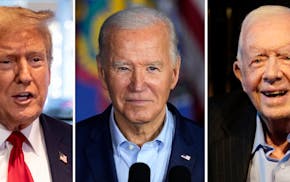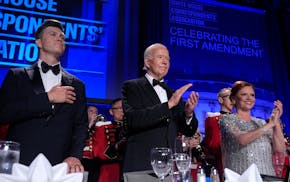Minneapolis officials long insisted they wouldn't stomach a light-rail line next to freight tracks in a part of the city popular with bicyclists, hikers and canoeists.
But with no palatable alternatives and time running out for action, they agreed to just that.
The Southwest Corridor light-rail deal accepted this week by city negotiators and Mayor Betsy Hodges sacrifices the interests of a small and well-connected group of opponents for promises to make the line more accessible and appealing to other Minneapolis residents. The City Council is expected to vote on it in late August.
Final approval would keep the Southwest project, the most expensive transit venture in the Twin Cities at $1.6 billion, on track to win federal approval this fall to advance in competition for funding. The nearly 16-mile line would run from downtown Minneapolis to Eden Prairie.
The deal emerged from six closed-door sessions — some of them heated — between city officials and regional transit planners that got off to a slow start when the city advanced a transportation agenda beyond the scope of the Southwest project.
A participant said the turning point came when retired U.S. Magistrate Judge Arthur Boylan, who was mediating the talks, suggested the city agree to scrap a light-rail tunnel planned north of a water channel in the Kenilworth corridor and use the savings to restore a Minneapolis station and improve access and amenities to other stations. A light-rail tunnel would still be built south of the channel.
It wasn't an entirely new idea. Suburban officials, who were at odds with Minneapolis on the project, had raised it in the spring.
Funding the extras
"Once the mediator suggested it, I think that helped us get a resolution," recalled Adam Duininck, a member of the Metropolitan Council, the agency planning the project, who was at the table during negotiations. "That helped the city get comfortable with it as an idea."
"When they walked through some of the things they wanted — the station improvements and other things — it became evident what they needed was some money to help fund these things," Duininck said. "It was the mediator who said, 'You know, one of the ideas could be to take out the northern tunnel, that would free up some resources.' "
"That's kind of how we ended up heading down that path," he said.
Boylan declined to comment on the mediation talks. "I promised confidentiality on my part and even giving some background might be viewed as a breach of my promise," he said in an e-mail.
Resistance slowly eroded
The deal earmarks $30 million to finance pedestrian bridge and bike access to three light-rail stations on the near North Side, a demand of community leaders there; better access to a station at Lake Street; restoring the station in the Kenilworth corridor at 21st Street, and improved landscaping, guardrails and noise abatement.
Running the light rail at ground level north of the channel between Lake of the Isles and Cedar Lake won't please Kenilworth corridor residents who have fought that concept as well as the earlier plan for a tunnel north of the channel.
The residents had the support of Hodges and City Council Member Lisa Goodman, who represents the Kenwood and Kenilworth area. They had insisted on moving the freight trains out of the corridor to make way for the light rail.
But the Minneapolis resistance gradually eroded in the face of some hard realities.
Some of the opposition in the corridor softened this year when residents of condos and townhouses south of the channel and closest to the proposed light-rail track accepted a Met Council plan for hiding it in a tunnel past their homes.
"You're fragmenting the opposition this way," said Carleton College political science Prof. Steven Schier. "Pretty artful."
The city's claim that there were promises to move the freight out of the corridor was ineffective. The Southwest project, in the works for years, wasn't going back to the drawing board for a new route. Rejecting the project wasn't an appealing option for a DFL mayor and City Council members who support transit.
Veteran City Council Member Elizabeth Glidden was on the Minneapolis negotiating team and played a critical role during mediation, according to several sources.
"Elizabeth was someone who saw the importance of this project to the city and knew it would be her responsibility to go to her colleagues on the council to gain their support for it," said Met Council Chairwoman Susan Haigh. "She took a significant leadership role," focusing on the broader benefits of the line over neighborhood interests.
Seeing the bigger picture
"We only have so many chances to build our transit," Glidden said in an interview this week explaining why she endorsed the deal. "I'm not pretending this is perfect for Minneapolis. But this is an important piece of serving the region."
Glidden noted that Southwest is intended as part of a bigger light-rail network that includes the existing Hiawatha and Central lines and envisions a future Bottineau line, all heavily dependent on federal funding. "If this line ended up not being built," she said of Southwest, "it would be extremely challenging to think how we're going to get a third line built to serve the Twin Cities metropolitan area."
Former Minneapolis Mayor R.T. Rybak and Hodges have supported adding streetcars to the city transit network, including linking them to light rail, and during Southwest mediation talks the city "wanted to pursue a partnership on streetcars with us," Duininck said. "Our response was that this is a bigger policy question that needs to go through regional vetting and not something that should be done during negotiations over municipal consent" for the Southwest project.
"There were a few contentious moments, but it never felt like either of us was really ready to walk away from the table," he said.
Hodges came out in support of the deal without much enthusiasm.
"Our support comes with sacrifice," she told reporters Tuesday. "The costs to be borne by our city and our residents are high. Freight was to be removed. Against our objection, it remains.
"The costs would have been far, far higher, however without … the protections that this tentative agreement gives the city," she said. "This is the most responsible way for the city to move forward and for the project to move forward."
Pat Doyle • 612-673-4504
Have you heard the one about Trump? Biden tries humor on the campaign trail

Donald Trump is running against Joe Biden. But he keeps bringing up another Democrat: Jimmy Carter
Utah GOP picks Trump-backed mayor as nominee to replace Sen. Mitt Romney, but primary foes await
A Hawaii military family avoids tap water at home. They're among those suing over 2021 jet fuel leak
